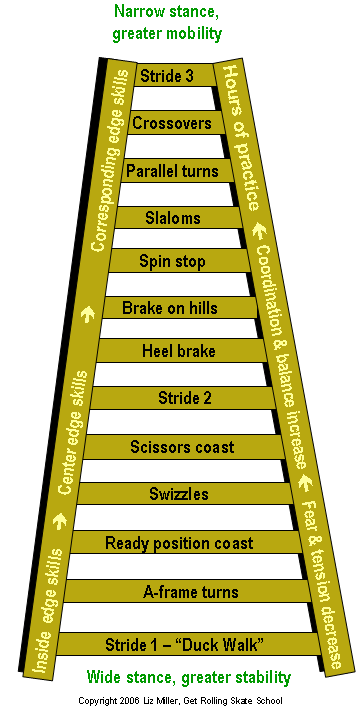Some experts believe it takes ten thousand hours of practice to achieve mastery in any particular area. That means if you average ten hours of skating a week (assuming other time commitments to family and a job), achieving world-class skills would take about 20 years. The studies showed it wasn’t innate talent that brought success to the now-famous people, it was lots and lots of hours doing something they were passionate about.
Whether or not you’re aiming to become a world-class skater, it is smart to tailor your hours of practice to achieve improvements sooner rather than later. Below I share tips that have helped my students over the years, and that continue to help me when I’m learning something new (always).
Quality Practice Time
- Skate at every opportunity, three times a week at a minimum; otherwise progress is slow and may even regress.
- Build your skating skills in the most beneficial sequence, starting with foundational moves. (See right.)
- Once you learn the proper mechanics of a move, do repetitive drilling to build intuitive muscle memory.
- If a group of skaters in your area meets regularly to roll around town, join them whenever you can.
- Skate with more advanced partners to get tips and and try their moves.
- Skating agility is just as important as efficient, powerful forward motion. Spend plenty of practice time working on drills that focus on balance, turning skills, flexibility and quick responses.
- Find ways to measure your progress. For example, track distance skated, completion time, and improvements related to your repeated drilling.
Dealing with Fear
Those skaters who look so fearless whizzing down a long, steep slope or doing gravity-defying tricks have encountered and dealt with many, many situations over the years. They look confident and coordinated because years of experience has taught them what tools work and when to use them.
Without that depth of experience, new or dicey situations will make most adult learners tense if not outright terrified. Tenseness and fear create a physical tightness that may result in real danger because it can change our center of gravity and limit our range of motion and flexibility.
Here are some tips to reduce the fearfulness and build more confidence:
- Spend lots of time practicing your skills (see above)!
- Learn and obey the Rules of the Road. You’ll see experts disobey, but save those shortcuts for later when you have the skills to deal with the situations they present.
- Repeatedly replay in your head your favorite “good save” when you did something right to avoid a big crash or mistake.
- When tenseness is freezing you up, slow and deepen your breathing and tell yourself, “Pretend I’m relaxed!” This may melt some of that tension away and make you safer.
- One less thing to worry about: keep your gear in great shape by performing regular maintenance.
